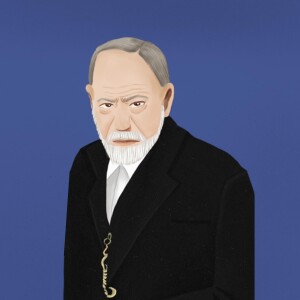
Tuesday Sep 12, 2023
The Life and Legacy of Sigmund Freud
Chapter 1:Summary of Freud
Freud: A Life for Our Time by Peter Gay is a comprehensive biography of Sigmund Freud, the founder of psychoanalysis. The book explores Freud's personal life, his professional achievements, and the impact of his theories on the field of psychology.
Peter Gay provides a detailed account of Freud's early life, including his childhood in Vienna and his education. He delves into Freud's personal relationships, detailing his complex dynamics with family members, friends, and colleagues. Gay also examines the cultural and historical context in which Freud developed his theories, including the influence of Viennese society and the rise of anti-Semitism.
The biography highlights Freud's groundbreaking work in psychoanalysis, examining his development of the concepts of the unconscious mind, dream interpretation, and the Oedipus complex. Gay explores Freud's ongoing collaboration and conflicts with other prominent psychologists and intellectuals of the time, such as Carl Jung and Otto Rank.
In addition to his professional achievements, the book also delves into Freud's personal struggles, including his battles with health problems, financial difficulties, and the challenges of being a Jewish intellectual during a period of escalating anti-Semitism.
Gay provides a balanced and nuanced portrayal of Freud, acknowledging his contributions to the field of psychology while also examining his limitations and controversies. He explores Freud's theories in a clear and accessible manner, making them comprehensible to readers who may be unfamiliar with psychoanalysis.
Overall, Freud: A Life for Our Time is a comprehensive and insightful biography that offers a comprehensive understanding of Sigmund Freud, his work, and his impact on the field of psychology.
Chapter 2:The Meaning of of Freud
The book "Freud: A Life of Our Time" by Peter Gay is a biography of the famous psychoanalyst Sigmund Freud. Peter Gay, a historian and scholar, explores the life, work, and impact of Freud, tracing his intellectual development and controversial theories. The book delves into Freud's personal life, relationships, and the historical context in which his ideas emerged. It also examines the reception and influence of Freud's psychoanalysis on psychology, culture, and society. Overall, the book seeks to provide a comprehensive understanding of Freud and his enduring significance in the field of psychology.
Chapter 3: Freud Chapters
Chapter 1: Childhood and Youth
This chapter focuses on Freud's childhood and youth, exploring the influence of his Jewish heritage and the social and cultural context in which he grew up. It also discusses his early interests in philosophy, literature, and science, which would lay the foundation for his later work in psychoanalysis.
Chapter 2: Freud's Medical Studies
In this chapter, Gay examines Freud's medical studies and his interest in neurology, which played a significant role in the development of his psychoanalytic theories. It explores Freud's early clinical experiences and his fascination with hypnosis and hysteria.
Chapter 3: Freud's Self-Analysis
Here, the author delves into Freud's personal life and his own self-analysis, which was crucial in the development of psychoanalysis. It explores Freud's reflections on his dreams, memories, and childhood experiences and how they shaped his theories.
Chapter 4: Freud's First Patients
This chapter focuses on Freud's early patients and the beginning of his work as a practicing psychoanalyst. It delves into his therapeutic techniques, including free association and interpretation, and discusses his theories on neuroses and the role of sexuality in psychological disorders.
Chapter 5: The Interpretation of Dreams
In this chapter, Gay provides an in-depth analysis of Freud's seminal work, "The Interpretation of Dreams." It explores Freud's theories on dream symbolism, wish-fulfillment, and the unconscious mind, as well as the critical reception and impact of his book.
Chapter 6: Freud and Jung
Here, the author examines Freud's relationship with his protégé Carl Jung. It explores their collaboration and eventual falling out, discussing the emergence of differences in their theories, particularly regarding the role of sexuality and the concept of the collective unconscious.
Chapter 7: Freud and Culture
Gay explores Freud's views on culture, religion, and civilization in this chapter. It examines his theories on the origins of religion, the role of the unconscious in cultural phenomena, and his ideas on society and social institutions.
Chapter 8: Freud and Sexuality
In this chapter, the focus is on Freud's theories on sexuality, which were revolutionary for their time. It delves into his concepts of the Oedipus complex, the sexual development stages, and the psychological effects of repressed sexual desires and taboos.
Chapter 9: Freud and Women
Here, the author addresses Freud's complex relationship with women. It explores his theories on femininity, the role of women in society, and his controversial views on female sexuality and the "penis envy" concept.
Chapter 10: Freud's Legacy
The final chapter reflects on Freud's legacy and his lasting impact on psychology, including his contributions to our understanding of the unconscious mind, dreams, and the therapeutic process. It addresses the criticisms and controversies surrounding his theories and examines the continued influence of psychoanalysis in contemporary psychology.
No comments yet. Be the first to say something!